Ata-ul-Haye Nasir, Ahmadiyya Archive & Research Centre
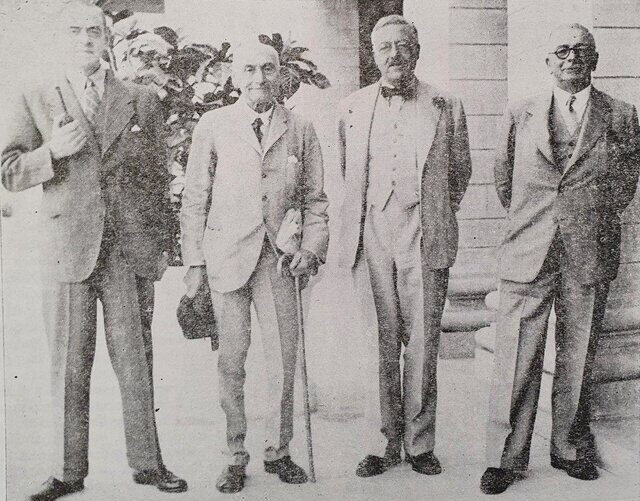
The background of Cabinet Mission
From 25 June to 14 July 1945, Indian political leaders gathered for a conference in Simla, India to discuss the Wavell Plan proposed by the British government on 14 June 1945. Unfortunately, the conference ended without any success.
On the other hand, the Labour Party had convincingly won the general elections in England, held on 5 July 1945, which had already expressed its willingness during the election campaign to grant freedom to India in due course.
Historian, Dr Ayesha Jalal writes:
“Simla’s failure, and Jinnah’s intransigence, had important repercussions in London. It helped to persuade influential Labour leaders that interim settlements were not the answer, and that the time had come to find final solutions. […]
“On 26 July 1945, Labour took office and the new Prime Minister and Secretary of State, Attlee and Pethick-Lawrence, immediately called for a review of the Indian situation.” (The Sole Spokesman: Jinnah, the Muslim League and the Demand for Pakistan, Sang-e-Meel Publication, p. 132)
On 21 August 1945, Viceroy of India Lord Wavell announced that elections to the central and provincial assemblies would be held in the coming winter, and that he would shortly go to England for consultation with the government. Accordingly, he visited England and returned to India on 16 September 1945. (Partition of India: Legend and Reality, by HM Seervai, Oxford University Press, 2005, p. 35)
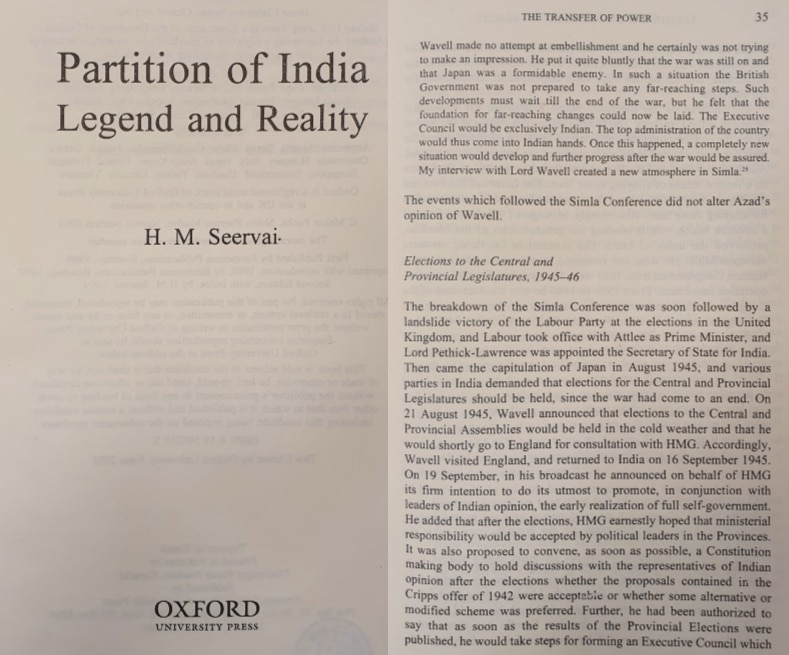
Thereafter, on 19 September 1945, an announcement was made in regards to the policy for India.
The Times reported:
“The Viceroy and the Prime Minister in broadcasts last night outlined plans for the early realisation of full self-government for India.
“The Government intends to convene as soon as possible a constitution-making body, and Lord Wavell is to undertake preliminary discussions with representatives of the Provincial Legislatures, as soon as they are elected, on the 1942 declaration.
“Discussions will also take place with representatives of the Indian States.
“The Viceroy will take steps after the elections to bring into being an Executive Council which will have the support of the main Indian parties.” (The Times, 20 September 1945, p. 4)

The elections for the central assembly took place in December 1945 and for the provincial assemblies in January 1946.
After these elections, Prime Minister Clement Attlee sent a delegation to India, commonly known as the “Cabinet Mission”, to discuss the transfer of powers from the British government to the Indian leadership and suggested a system for India with three tiers: the provinces, provincial groupings and the centre.
On 19 February 1946, the Secretary of State for India, Lord Pethick-Lawrence announced in the House of Lords that three Cabinet Ministers were going to India to discuss with leaders of Indian opinion for the framing of an Indian constitution. (India Steps Forward: The Story Of The Cabinet Mission In India In Words & Pictures, by Jag Parvesh Chander, The Indian Printing Works, Lahore, 1946, p. 13)
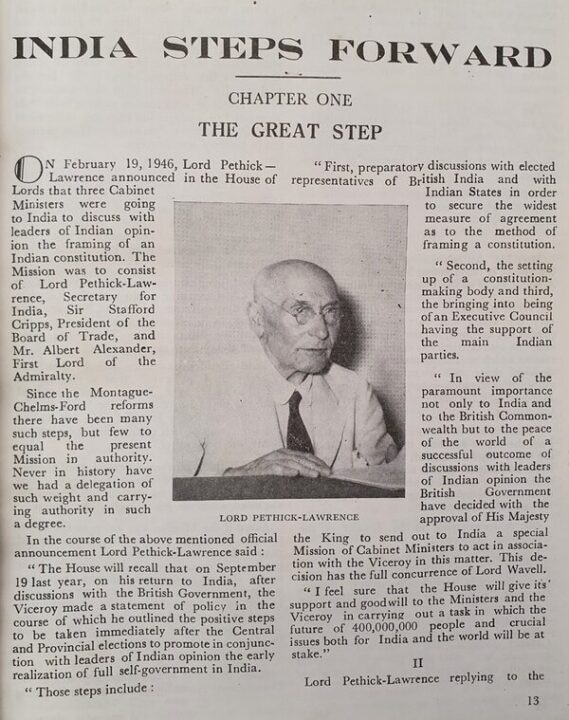
Regarding this, Hazrat Sir Chaudhry Muhammad Zafrulla Khanra, the first foreign minister of Pakistan, stated:
“No agreement could be reached between the Muslim League and the Congress till 1946 though the British government had announced that India would be soon independent. At that time, as far as one could guess, prime minister Attlee was not at all inclined to partition India. He was in search of a solution that was acceptable both to the Congress and the Muslim League while India remained a unified entity both politically and economically. In the spring of 1946, he entrusted this task to his three colleagues. […] They were required to go to India to find a solution to the Indian riddle by consulting the leaders of the two political parties and other political forces.” (Tehdis-e-Nemat or Recollection of Divine Favours [English], pp. 513-514)
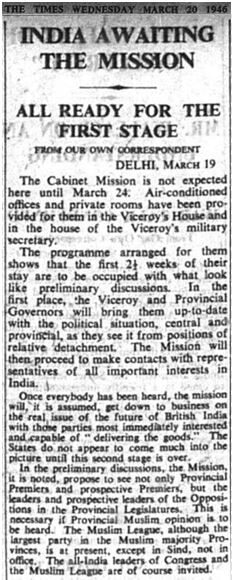
On 15 March 1946, just before the despatch of the Cabinet Mission to India, Mr Attlee, the Prime Minister, stated in the British Parliament:
“My colleagues are going to India with the intention of using their utmost endeavours to help her to attain that freedom as speedily and fully as possible. What form of Government is to replace the present regime is for India to decide; but our desire is to help her to set up forthwith the machinery for making that decision. […]
“India herself must choose what will be her future Constitution; what will be her position in the world. I hope that the Indian people may elect to remain within the British Commonwealth. I am certain that she will find great advantages in doing so. […] But if she does so elect, it must be by her own free will.
“The British Commonwealth and Empire is not bound together by chains of external compulsion. It is a free association of free peoples. If, on the other hand, she elects for independence, in our view she has a right to do so. It will be for us to help to make the transition as smooth and easy as possible.” (Hansard, HC Deb 15 March 1946, Vol. 420, cc. 1413-76, https://api.parliament.uk/historic-hansard)
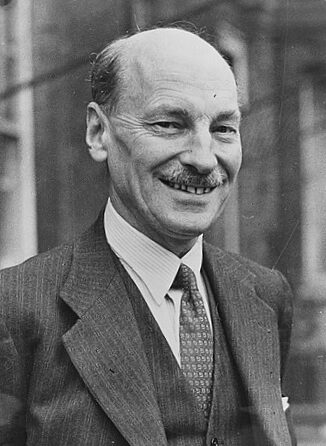
In response, Mr Godfrey Nicholson of Farnham, Surrey stated:
“India wants to walk hand in hand with us along the difficult road that lies ahead. We see that road, perhaps, as more beset with perils than do the Indians, for India has been little touched by the earth-shaking events of the past few years. […] A heavy responsibility rests upon this Cabinet Mission, because on their action will depend a great deal in the future. Let it go forth from this House and from this country that we are full of love and friendliness for India, that we want the Indians to be a free people and that we wish to face with them, in a spirit of comradeship, whatever the future may hold.” (Ibid)
On 23 March 1946, the Cabinet Mission arrived in Karachi, which consisted of the Secretary of State Pethick-Lawrence, President of the Board of Trade Sir Stafford Cripps and the First Lord of the Admiralty Mr AV Alexander.
“As the Viceroy’s Executive Council told the Mission, the main obstacle to a compromise was an issue which for long had been swept under the carpet: the need to redraw provincial boundaries if the Muslim provinces were to be given more autonomy than they had previously possessed. […] The Mission could not be allowed to fail; the Executive Council insisted, it ‘must refuse to permit a breakdown.’” (The Sole Spokesman: Jinnah, the Muslim League and the Demand for Pakistan, by Dr Ayesha Jalal, Sang-e-Meel Publication, pp. 176-178)
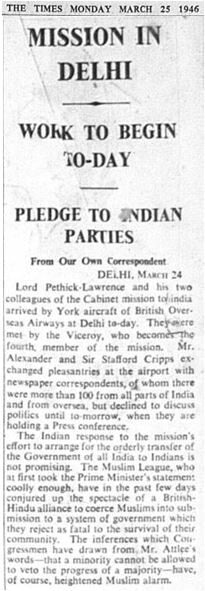
Hazrat Khalifatul Masih II’sra guidance to the Cabinet Mission and Indian leaders
In regards to the Cabinet Mission, Hazrat Mirza Bashiruddin Mahmud Ahmad, Khalifatul Masih IIra wrote an article, titled Parliamentary Mission Aur Hindustanion Ka Farz, which was published in the 6 April 1946 issue of Al Fazl.
Its English translation was published in the May 1946 issue of The Review of Religions, titled “The Cabinet Mission and the Duty of Indian Leaders”. A part of this article was also published in the newspaper, Inqilab of Lahore on 19 April 1946 (p. 3).
While granting his valuable guidance in this article, Huzoorra stated:
“The Cabinet Mission arrived in India about a fortnight ago to decide the political and constitutional future of the country. Several members of my community have inquired from me why the community has not been afforded an opportunity to express its views on the questions with which the Mission is concerned. My reply to them has been:
“First, that our community is a religious community (though it might be observed that the Indian Christian community has been invited to express its views before the Mission). Secondly, that so far as the political future of the country is concerned we are for the present in the same position as the other Muslims.
“Thirdly, that we are a small minority and the Mission is concerned to ascertain the views of those parties and interests which can help to make or mar the political future of India and from the purely political point of view we are not regarded as being very important. […]
“Fourthly, there is the consideration that irrespective of the fact whether any member of the community is or is not able to place its views directly before the Mission it is always open to us to put forward our views in writing.
“In pursuance of the last consideration, therefore, I proceed to invite the attention of the Mission and the leaders of political opinion in the country to certain important matters in this my first statement.
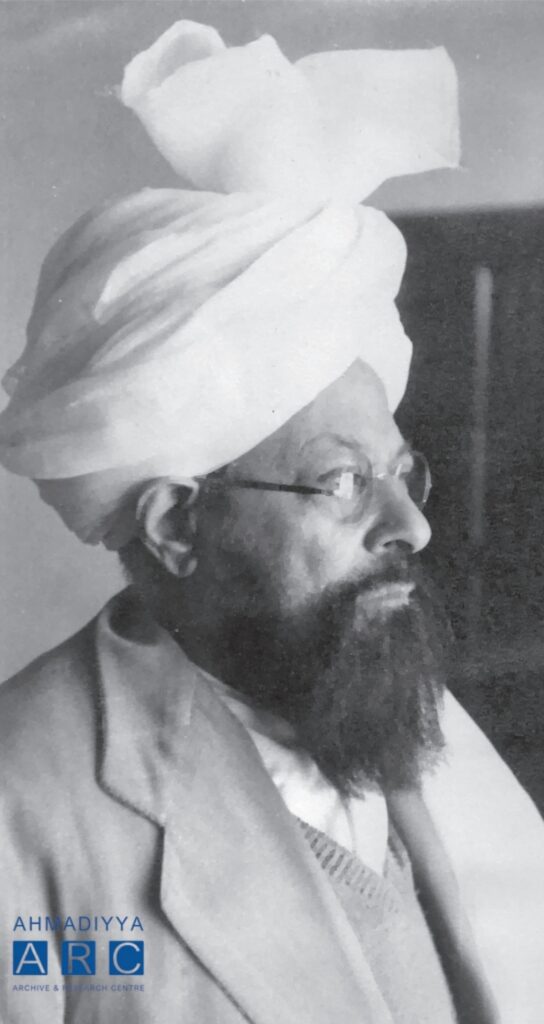
Moral Principles
“To the members of the Mission I desire to say in the first instance that confusion and disorder in international affairs are on the increase by reason of the fact that Governments do not consider themselves bound by moral principles in the political field, whereas political policies are adopted with the object of giving satisfaction to individuals, and individuals are accustomed to judging every matter from the moral standpoint. The consequence is that when people find that a decision has been arrived at, which is not in accord with well-recognised moral principles, it fails to give satisfaction and this feeling of dissatisfaction eventually incites them to agitation and disorder.
“It is true that agitation also results from the frustration of communal and national hopes and desires, but such agitation is short-lived and may be remedied without much difficulty. On the other hand, a decision which has been arrived at in defiance of moral principles, might become the cause of unrest and disorder which may extend over decades or even centuries. My advice to the Mission, therefore, is that they should endeavour to find a solution to the problems of India not merely on the basis of political policies but on the basis of moral principles so that if their decision should cause unrest or agitation in the country they should not flourish for any length of time.
“Secondly, it is again true that political agreements may take on different aspects in changing circumstances. For instance, an alliance may be entered into between two Governments but if later on, one of these Governments is repudiated by its own people it may not be able to insist that the other party to the alliance should continue to be bound by the agreement into which it had entered. For all agreements are based on the presumption that the Governments entering into them are representative of the views of their respective peoples. […]
“If His Majesty’s Government intends to go back upon any of their previous promises relating to India they must state clearly the circumstances under which those promises were made and the change which has taken place in those circumstances, the natural consequence of which should be a departure from the terms of the promises. So long as this is not done, the mere assertion that circumstances have changed will only create justifiable suspicion with regard to the motives of the Government in the minds of the community prejudicially affected by the repudiation of a previous promise.
“Moral principles are more powerful than the united strength of Great Britain and India, nay, than even the united strength of the whole world. If, therefore, there has been no fundamental change in the circumstances, the Cabinet Mission instead of using equivocal expressions should plainly declare that the previous Government had to secure the support of certain communities for the war effort, and had dishonestly given assurances to them which the present Government is not prepared to carry into effect.
“It is not right, therefore, that they should in the same breath endorse the honesty of previous Governments and yet try to back out of the promises made by those Governments by asserting that circumstances have changed, when no such change, as would justify a repudiation of those promises, has actually taken place. People at large may be deceived by clichés or catchphrases, but the attitude of those who are given to reflection is not affected by mere words.
“The third consideration I would like to place before the Mission is that if a situation is created which should operate to deprive a minority of any part of its just rights the responsibility will lie on the shoulders of His Majesty’s Government. They cannot escape blame by saying that they are not directly responsible for the result. They are responsible for bringing into being factors of which the result is the necessary consequence.
“The fourth matter to which I desire to draw the attention of the Mission is that if the Mission takes up an attitude of justice and fair dealing, there is every hope that they will succeed in bringing about a communal settlement. I am not prepared to admit that the shape that India has been compelled to adopt under British Rule is necessarily its true shape but equally I am not prepared to deny that whatever unity can be achieved in India by mutual agreement will be beneficial both for India and for the rest of the world. […]
British Commonwealth
“The cooperation of the different parts of India in setting up a common constitutional structure and the cooperation of India with the British Commonwealth must be secured by mutual agreement. […] My experience is that most British statesmen are inspired by the desire to force upon India everything that their experience has shown to have been beneficent in its operation in Great Britain. Conditions in India are very different from conditions in Britain. Freedom has one connotation in Britain and another in India and so has justice. […] In short, expressions like freedom and democracy are not enough. It is necessary to inquire what the connotation of these expressions is among different peoples. […]
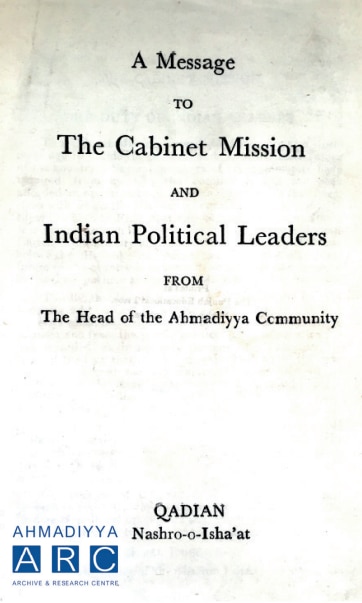
India: Our Country
“My advice to the Muslim Leaguers is that India belongs as much to us as it belongs to the Hindus. We should not seek to weaken our country merely because we are irritated with the policies and activities of some of the extreme sections of the majority community. We have contributed a large share towards building up the greatness of this country. […] We have served India for eight hundred years. From Peshawar to Manipur and from the Himalayas to Madras, are to be found the graves of Muslim patriots who devoted their lives to the service and progress of this country. Muslim monuments are to be found throughout the length and breadth of India. Shall we abandon all these memorials to our past services and sacrifices in the cause of India and can anyone, in spite of these, assert that India belongs to the Hindus only? […]
“We should certainly not agree to anything which spells death and disaster for Islam and Muslims, nor should we do anything which should make it impossible for Islam to continue to flourish throughout India. I am convinced that we can adopt a course which is just and fair. Only, it is necessary that we should not permit our sentiments to run away with us. By basing political policy upon justice and moral principles, Islam has raised politics to a very high level. Standing on this eminence, can we not lay the foundations of peace and goodwill? By emerging from the atmosphere of sentimental slogans, can we not begin to tackle the world of reality so as to secure not only our own true welfare but also the true welfare of others? […]
Congress to Walk warily
“I would advise the Congress to walk very warily on this occasion. They must remember that political conditions are always liable to change and that the seeds some of them are seeking to sow may yield very bitter fruit. They may or may not be convinced but it is a truth nevertheless that He Who created this Universe is its Ultimate Ruler and He shall never permit the rich and powerful majority to tyrannise over and persecute the weak minority. Islam shall live and flourish though owing to the defects and shortcomings of Muslims, it may have to pass through a period of difficulties.
“It must also be remembered that though, as I have stated above, I myself am of the view that if possible we should by mutual agreement maintain the unity of India, as it has been maintained during several centuries, yet if Muslims should eventually decide to cut asunder from the rest of India and Britain should seek to keep them united to Hindu India against their will, and, as Mr Jinnah has announced, Muslims should decide to resist this […] they would certainly not be in the position of rebels in the eye of law. For, this would be a new constitutional arrangement and a new form of government. The outgoing authority would have no right to subject Muslims, who were at one time rulers of this country, to the subordination (against their will) of the other community.
“At the time of the settlement of a new constitution each part of the country is entitled to make a decision for itself and if one part decides to enforce its rights […] the people thereof cannot be regarded as rebels. On the other hand, Hindus were never the rulers of those parts of the country in which Muslims are in a majority; they cannot claim the support of the law in seeking to impose their rule upon them. On the transfer of political power from Great Britain to India, no question of status quo arises. […]
“My advice, therefore, is that this problem should be sought to be resolved by goodwill and not by force or self-devised formulae. I assure my Hindu brethren that my heart is with them in the sense that I desire that Hindus and Muslims should come to a perfectly free agreement that they should live together in India as brethren. […]
False Reasoning
“I must, however, urge upon my Hindu brethren that false reasoning can never establish a truth and often makes truth itself doubtful. To my mind, it is no argument against Pakistan that the separation of the Muslim Province from the rest of India would place India’s defences in jeopardy. Has the defence of the United States been weakened by the separation of Canada or by the independence of Mexico? Or, has the defence of Brazil been weakened by the separation of Argentina? Even if the Muslim provinces are separated from the rest of India, the population of the latter would still be almost double that of the USSR, and nearly two and a half times that of the USA, and almost four times that of pre-war Germany, and its area would also be still very large.
“In one breath we are told that the Muslim provinces will not be able to maintain themselves on a progressive level after separation and in the next breath we are told that India will lose its greatness by their separation. This is the kind of argument which Russia is advancing in support of its policy of absorbing Poland, Romania, Bulgaria and some of the provinces of Turkey and Iran. […] I would again stress the need for each side to base its claims upon moral principles.
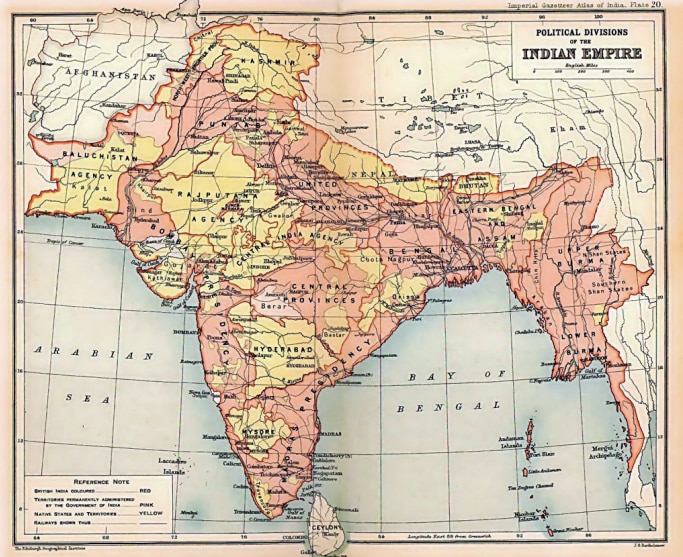
Representative Character of the League
“Again, it is alleged that the Muslim League does not correctly represent Muslim opinion in the country inasmuch as a majority of the representatives returned to the Legislatures on the Muslim League ticket are big landholders. This is not in fact true, but even if it were, could it be said that the electors were not at liberty to choose big landholders as their representatives? This kind of reasoning merely indicates that in the opinion of Pt. Jawaharlal Nehru (who has put forward this argument) Muslims are not fit to exercise their franchise. If he is really of that opinion, honesty should have compelled him to announce that as Muslims were unfit to exercise the franchise they should not be consulted with reference to the future constitution of the country.
“Had he said this, he would at least have been logical, though still in the wrong. But the statement that as Muslim electors have elected a certain number of big landholders as their representatives, the latter cannot be regarded as representing the correct Muslim opinion, is so illogical that one would not expect a leader like Pt. Jawaharlal Nehru to make himself responsible for it. […]
“Moreover, it is not true in fact that a majority of Muslim League representatives are big landholders. Take the Punjab as an instance. There are in the Punjab Assembly 79 Muslim League members and six Unionist Muslims in coalition with the Congress. Out of these six, three namely Nawab Sir Khizar Hayat Khan, Nawab Sir Allah Bakhsh Khan and Nawab Sir Muzaffar Ali Khan, that is to say, 50 per cent of the total, are big landholders. I do not know the remaining three personally, but it is possible that someone of them may also be a big landholder.
“As against this, out of the 79 Muslim League members there are only four big landholders namely, the Nawab of Mamdot, Nawab Sir Mohammad Jamal Khan Leghari, Mian Mumtaz Daultana and Mian Allahyar Khan Daultana. Two others, Malik Sir Feroz Khan Noon and Major Ashiq Hussain possibly also be included in this category. This means that six out of 79 Muslim Leaguers, that is to say, 7.5 per cent of the total are big landholders, as against 50 per cent of the Muslim Unionists who are in coalition with the Congress. […]
“I have in this very sincere statement confined myself to indicating my views very broadly. If the need arises, I shall be prepared without considerations of fear or favour, to place more concrete proposals before the Cabinet Mission and those sections of the public who have ears to hear and minds to reflect.” (The Review of Religions, Vol. 45, pp. 78-93, May 1946)
In this way, Hazrat Mirza Bashiruddin Mahmud Ahmadra provided timely, critical and actionable guidance to Britain and the Indian leaders, but as it was not followed, British India had to face horrific and unprecedented turmoil which led to the Indian partition.
Related Content
- Hazrat Musleh-e-Maud’s services to the Muslim cause: Guiding Muslims of the Indian subcontinent amid religious and political conflicts
- Hazrat Musleh-e-Maud’s response to the Shuddhi movement and the Jamaat’s relentless services for Islam
- The Simon Commission, First Round Table Conference and Hazrat Musleh-e-Maud’s valuable guidance
- Freedom is the birthright of everyone: Hazrat Musleh-e-Maud’s guidance regarding India’s independence and partition
- The Wavell Plan and Hazrat Mirza Bashiruddin Mahmud Ahmad’s (ra) call for peace and India’s freedom
- The Simla Conference, 1945: Hazrat Mirza Bashiruddin Mahmud Ahmad’s (ra) guidance prior to the conference and response to its failure
- The deadlock over Interim Government and Constituent Assembly for India: Its background and Hazrat Mirza Bashiruddin Mahmud Ahmad’s (ra) guidance
- May India and Pakistan live amicably: The Partition of India, 1947 and Hazrat Mirza Bashiruddin Mahmud Ahmad’s heartfelt wish

